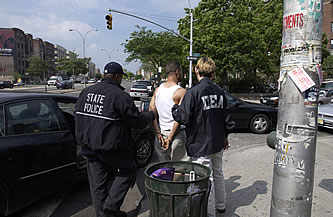Stop and Frisk Laws in Pennsylvania

The History of Stop and Frisk
In 1968, the Supreme Court ruled that police officers could detain or frisk a person if there is a reasonable suspicion of wrongdoing. If the police believe that the person stopped is hiding a weapon, they can frisk that individual to check for dangerous items. Terry v. Ohio granted authorities the right to search pretty much anyone they feel is behaving in a suspicious manner. Terry v. Ohio introduced the Stop and Frisk concept, which has evolved into the process used today. While this procedure was originally intended to improve police officer and public safety, it has been challenged in recent years, with a variety of groups leveling charges of racial profiling and unfair stops and seizures at police groups in Pennsylvania, New York and other states.
Stop and Frisk Components
- Stop: A stop involves either a physical detention of an individual or a display of authority which results in an individual understanding they are not free to leave the area until the police release them.
- Frisk: An officer will actually lay hands on the stopped individual and pat down their clothing to see if they are hiding or carrying any weapons or drug paraphernalia. A frisk is done over the clothing and is intended to protect the officer from harm by exposing any dangerous weapons right away.
Used as it was originally intended, Stop and Frisk should only be implemented when officers have a reasonable suspicion that the individual is engaging in criminal activity or hiding a weapon. In recent years, charges of abuse by police in some cities detail the Stop and Frisk practice as one that is used illegally against minorities. Residents in Pittsburgh created a Change.org petition challenging the practice and the entire concept of Stop and Frisk has been challenged in the city.
Stop and Frisk in Pennsylvania
Pittsburgh
A Pittsburgh resident created a Change.org petition to end Stop and Frisk within the city, citing several local and national cases in which police abused their power and overstepped boundaries, resulting in injury or even death for those stopped for a warrantless search. The petition cites some troubling statistics: 60% of those chosen for Stop and Frisk in the city are African American, even though African Americans make up only a quarter of the city’s residents.
Philadelphia
In July 2011, the ACLU and the Philadelphia Police Department reached a settlement in the Bailey v. City of Philadelphia case that required the city to begin to document Stop and Frisk statistics. Citing abuse of power by the police department and charging the city with unfair racial profiling practices, a group of 8 minority defendants sued the city. The settlement required the city to furnish reports and statistics regarding the citizens that were stopped and searched each year.
Data for 2014, the most recent year available, reveals that African Americans are more likely to be detained and searched in Philadelphia than their white counterparts – and that they are more likely to be detained without reasonable cause. Despite the still disproportionately high numbers, the actual number of stops has gone down since the city began actively tracking and reporting the data. Actually having to report a stop and detail both the reason for the action and the outcome may reduce stops simply due to race or other, unjustifiable factors.
Know your Rights
Are police in Pennsylvania and other states targeting specific minority or demographic groups for unfounded or unjustified warrantless searches? The ACLU and other groups, including the nonprofit Sunlight Foundation, believe so.
If you have been unfairly stopped and frisked or you have experienced any adverse interaction with authorities, you need the right team on your side. Contact us for help with your legal challenges and to learn more about protecting your rights when it comes to Stop and Frisk action in Pennsylvania.










